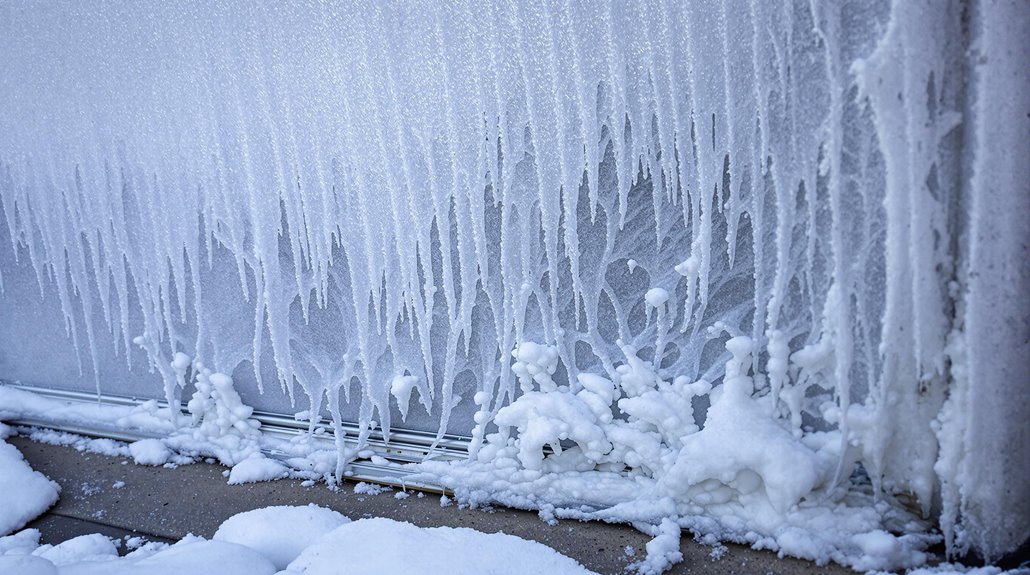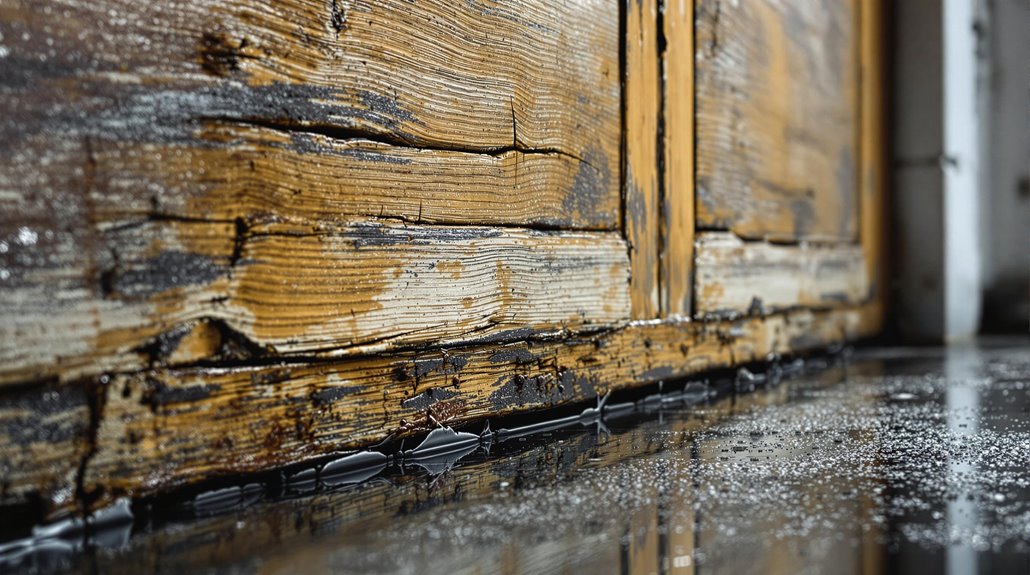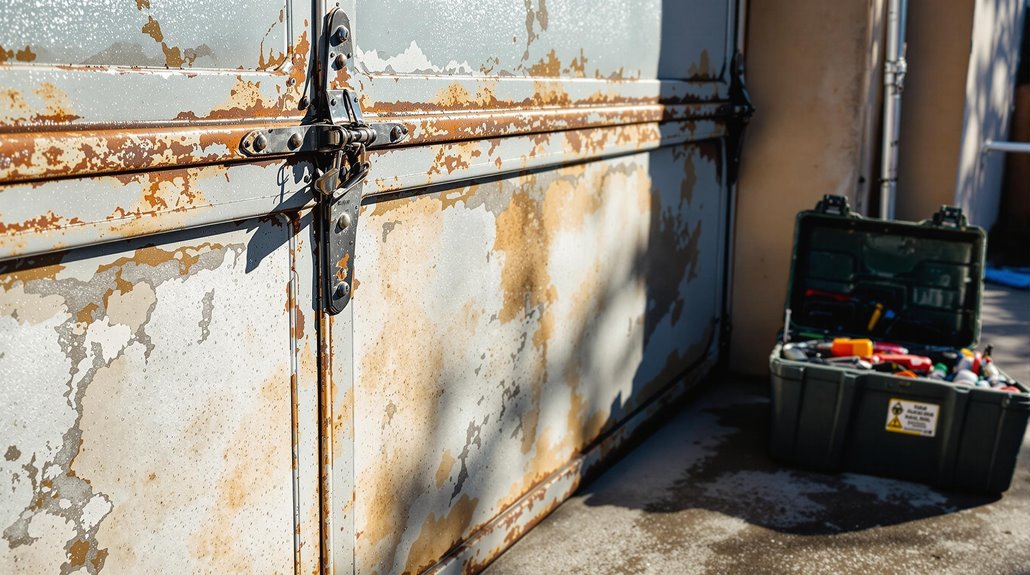Weather greatly impacts your garage door's performance. Temperature changes cause materials to expand and contract, leading to misalignment and operational issues. In cold weather, metal parts can freeze or become brittle, making doors hard to open. High humidity can cause wooden doors to swell, resulting in poor fitting and increased strain on mechanisms. Rain can lead to rust and corrosion, weakening metal components. Extreme heat can make the door's motor overheat with frequent use. Regular maintenance is essential to prevent these problems and guarantee proper functioning throughout the seasons. Exploring further reveals valuable tips for effective upkeep.
Key Article Highlights
- Temperature fluctuations cause materials to expand and contract, leading to misalignment and difficulty in opening or closing the garage door.
- High humidity can cause wooden doors to swell, altering their structure and putting extra strain on opening mechanisms.
- Extreme cold can freeze components, thickening lubricants and increasing friction, hindering the door's operation.
- Moisture exposure can lead to rust and corrosion on metal parts, compromising the door's structural integrity and causing costly repairs.
- Regular maintenance, including lubrication and inspections, is essential to ensure smooth operation and prevent weather-related issues.
Temperature Fluctuations
Experiencing temperature fluctuations can substantially affect the performance of garage doors. These changes in temperature can lead to material expansion and contraction, which may impact how well the door operates. For instance, when temperatures rise, the materials that make up the garage door can expand. Conversely, when temperatures drop, these materials may contract.
This constant cycle of expansion and contraction can create thermal stress on different components of the door. For example, metal parts may warp, and wooden doors may crack if not properly maintained. This stress can cause garage doors to become misaligned, making them difficult to open or close. Additionally, the seals around the door may degrade faster due to these temperature changes, resulting in energy loss and increased utility bills.
To guarantee long-lasting performance, it is essential to choose materials that can withstand temperature fluctuations. Regular maintenance, such as lubricating moving parts and checking seals, is also vital. By understanding the effects of temperature changes, homeowners can take proactive measures to enhance the functionality and lifespan of their garage doors.
Humidity Effects
Humidity can profoundly affect the performance and longevity of garage doors. High humidity levels can cause wooden doors to absorb moisture, leading to wood swelling. This swelling alters the door's structure, making it fit poorly within the frame. As a result, you may experience door misalignment, which can hinder its ability to open and close smoothly.
When a garage door is misaligned, it can put extra strain on the opening mechanism. This strain may lead to increased wear and tear, causing the system to fail sooner than expected. In extreme cases, a misaligned door can get stuck or even cause damage to the garage door opener.
To mitigate the effects of humidity, regular maintenance is essential. Inspecting the door for signs of swelling and ensuring proper sealing can help protect against moisture. Additionally, choosing materials less susceptible to humidity changes can improve overall performance.
Extreme Cold Challenges

Extreme cold can present significant challenges for garage doors, particularly those made of metal or with mechanical components. As temperatures drop, various parts of the garage door can become frozen. This freezing can prevent the door from opening or closing properly, causing frustration and potential damage.
One common issue during extreme cold is the freezing of components, such as the tracks, springs, and hinges. When these parts freeze, they can hinder the smooth operation of the door. Additionally, lubrication issues can arise in cold weather. Many lubricants used on garage doors can thicken or become ineffective in low temperatures. This can lead to increased friction and difficulty in moving parts.
To combat these challenges, it is essential to prepare your garage door for winter. Regular maintenance, including checking for frozen components and using cold-weather lubricants, can help guarantee smooth functionality. Homeowners should be proactive in protecting their garage doors from extreme cold. By understanding these issues and taking preventive measures, you can maintain the freedom and convenience that a properly functioning garage door provides, even in harsh winter conditions.
Summer Heat Impacts
High summer temperatures can have a noticeable impact on garage doors, affecting their functionality and longevity. As the heat rises, the metal components of the door tend to expand. This metal expansion can create issues, particularly in the door's alignment. When a garage door is not aligned properly, it may struggle to open or close smoothly. This misalignment can lead to unnecessary wear and tear, which may result in costly repairs.
Additionally, the heat can affect the door's insulation. If the insulation is not adequate, it can cause the garage to become excessively hot, impacting items stored inside. Homeowners may find that their garage door opener also suffers during these warm months, as the motor can overheat if used frequently.
To mitigate these issues, regular maintenance is essential. Checking the alignment and ensuring that all metal parts are lubricated can help keep the door functioning well. Investing in high-quality materials can also extend the lifespan of the garage door, allowing it to withstand the summer heat better. By being proactive, homeowners can enjoy a functional garage door without the complications of summer's heat.
Rain and Moisture Issues

Rain and moisture can substantially affect garage doors over time. These conditions can lead to rust and corrosion on metal parts, compromise the integrity of seals, and cause malfunctions in electrical components. Understanding these issues is essential for maintaining the functionality and longevity of your garage door.
Rust and Corrosion Risks
Moisture from prolonged exposure to rain can substantially increase the risk of rust and corrosion in garage doors. This is especially true for those living near coastal areas, where salt damage from ocean spray can further exacerbate the problem. Rust can weaken the structural integrity of a door, leading to costly repairs or replacements.
Here is a simple table summarizing the key factors contributing to rust and corrosion:
| Factor | Impact on Garage Doors |
|---|---|
| Prolonged Rain | Increases moisture levels |
| Humidity | Promotes rust formation |
| Coastal Exposure | Enhances salt damage |
| Lack of Maintenance | Allows corrosion to progress |
| Material Type | Determines rust susceptibility |
For homeowners, it is essential to regularly inspect garage doors for early signs of rust and corrosion. Taking proactive measures—like applying protective coatings or ensuring proper drainage around the garage—can help mitigate these risks. By remaining vigilant, you can maintain the functionality and aesthetics of your garage door, ensuring it serves you well for years to come.
Seal Integrity Concerns
The impact of weather on garage doors extends beyond rust and corrosion to include concerns about seal integrity. Rain and moisture can markedly affect the seals that keep your garage dry and protected. Over time, exposure to these elements can lead to seal degradation. When seals wear out, they lose their ability to prevent water from entering the garage, which can result in damp conditions and potential damage to stored items.
Additionally, poor seal integrity can impact door alignment. If the seals do not sit correctly, they can cause the door to misalign. This misalignment can make it difficult to open and close the garage door properly, affecting its overall functionality. Ensuring that seals are in good condition is essential for maintaining both performance and protection from the elements.
Regular inspections of your garage door seals are vital. Look for signs of wear, cracks, or gaps that may indicate seal degradation. By addressing these issues promptly, you can prevent further damage and maintain the integrity of your garage space. Taking care of your seals will help you enjoy the freedom and convenience of a dependable garage door.
Electrical Component Malfunctions
Garage door systems rely heavily on electrical components for their operation, and exposure to rain and moisture can lead to significant malfunctions. When water seeps into electrical parts, it can create power surges that disrupt the normal functioning of the system. These surges can cause circuit failures, resulting in the garage door not opening or closing properly.
Moisture can also corrode wires and connections, leading to further electrical issues. This damage may not be immediately evident but can worsen over time. Homeowners may find themselves facing unexpected repair costs due to these hidden problems.
In addition, rain can affect the sensors that guarantee the garage door operates safely. If these sensors become wet, they may not function correctly, causing the door to behave erratically.
To minimize these risks, it is essential to maintain the garage door's electrical components and guarantee they are properly sealed against moisture. Regular inspections can help identify potential issues before they escalate. By taking these steps, homeowners can enjoy the freedom of a smoothly operating garage door, regardless of the weather.
Wind and Storm Considerations
As storms approach, it is essential to think about how wind impacts garage doors. High winds can put significant stress on garage doors, especially if they are not built to withstand such conditions. Many areas have specific wind codes that dictate how strong a garage door should be to stay safe and functional during storms.
One major concern during windy weather is debris damage. Loose objects can become dangerous projectiles, causing dents or even breaking the door. Ensuring your garage door is properly reinforced can help prevent such damage. It is vital to inspect the door regularly and make sure it meets local wind codes.
Additionally, homeowners should consider the direction of the wind. Wind can push against the door, which may cause it to bow or warp. If a storm is forecasted, securing your garage door can provide an extra layer of protection. Using wind-resistant materials and ensuring proper installation can help maintain the door's integrity during severe weather.
Taking these precautions will not only protect your garage door but also give you peace of mind as you weather the storm.
Maintenance Tips for All Seasons

Keeping your garage door in top condition throughout the year requires regular maintenance. This maintains smooth operation and extends the life of your door, regardless of the weather.
Start by scheduling seasonal inspections with a professional. In spring, check for any damage from winter storms, and lubricate the moving parts to prepare for warmer months. Summer should focus on examining the door's alignment and making certain it opens and closes without issues.
In the fall, clean the tracks and sensors to avoid any buildup that could cause problems when winter arrives. Finally, winter maintenance is vital. Inspect seals and insulation for any wear, which helps maintain energy efficiency and prevents cold drafts.
In addition to these seasonal checks, keep your garage door clean and free from debris year-round. This simple task can prevent rust and maintain smooth functioning. By following these maintenance tips and sticking to a seasonal scheduling plan, your garage door will remain reliable and efficient, giving you the freedom to enjoy your space without worry.
Frequently Asked Questions
How Can I Tell if My Garage Door Needs Maintenance?
To determine if your garage door needs maintenance, check for door alignment issues and perform a hardware inspection. Look for uneven gaps, unusual noises, or difficulty opening and closing, which may indicate necessary repairs.
What Are Signs of Weather-Related Garage Door Damage?
Like a tree bending in the wind, garage doors can show signs of weather-related damage. Look for swollen frames, warping doors, rusting components, bent panels, misaligned tracks, or stuck mechanisms as indicators of trouble.
Can Weather Affect My Garage Door Opener?
Yes, weather can affect your garage door opener. Cold temperatures may lead to thickened lubrication, causing frozen mechanisms that hinder operation. Regular maintenance and appropriate lubricants can help guarantee smooth functionality in varying weather conditions.
How Often Should I Inspect My Garage Door?
To maintain the harmony of your garage door, conduct annual inspections. Regular professional checkups guarantee smooth operation, preventing unexpected disruptions. Embrace the freedom of a well-functioning door by prioritizing its maintenance for lasting peace of mind.
Do Different Garage Door Materials Perform Better in Certain Weather?
Different garage door materials exhibit varying levels of climate resilience and material durability. For example, steel doors often withstand harsh conditions better than wood, which may warp or swell in extreme temperatures or humidity.
